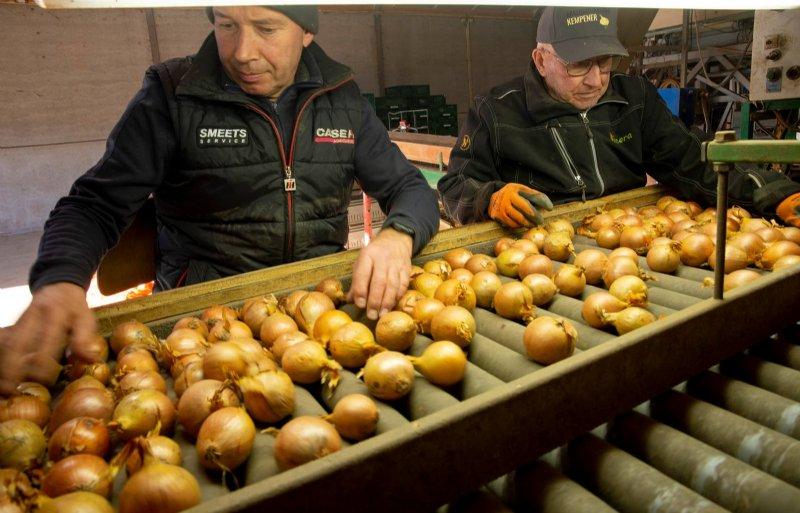Agrarian entrepreneur Rudolf Kempener from Eijsden in South Limburg believes that climate change calls for a different way of doing business. Irrigating will remain a pure necessity, certainly in the near future.'
Mainly onion cultivation
.The main branch within the arable farm in Eijsden is the cultivation of onions. 'But we also do winter wheat and corn and beets.' In order to complete the cultivation plan, the farm makes land swaps. A fellow farmer grows potatoes on my land and I grow onions on his. Kempener grows the onions one on six. With the land swap the Limburg entrepreneur keeps a broad cultivation plan. He doesn't want to compromise on that.
'This colleague also has the possibility to irrigate my onions. We started doing that in 2018. We never did that before, but in that year we had to deal with a really dry summer for the first time. Before that, there were also dry summers, but not as extreme as in 2018,' Kempener points out.
'In that year we purchased our first rain reel, just to save what could be saved.' Kempener had made that investment more or less instinctively. He also thought that such dry summers would occur more often. That turned out to be the case in three consecutive years. The drought was not too bad in 2021. I only had to water the onion sets once, while less than six weeks later the extreme rainfall made everything drown.
"This year it was all hands on deck to keep the fungi out of the crop."
Yellow and red onions
Yellow and red onions
This year it took all hands on deck to keep the fungi out of the crop, says Kempener. As an entrepreneur, you'd rather not have to resort to irrigation, but you have more control over it than extreme rainfall. There is more tare in the onions this year, because the onions have been under water almost continuously with their roots, and onions don't cope well with that,' he explains.
'For a number of years we have started growing onion sets and then the yellow seed onions which go into storage, so that we can sort them all winter. We also have about 2 hectares of red seed onions for the niche market. That market is a lot smaller, also because the red onion is mainly processed in salads," says the entrepreneur.
Kempener took over the company from his father in 2020, who still helps out himself. As do his two daughters. 'We process the vast majority of the onions ourselves. This means that we sort and pack them by size. The smaller size, 45-60, is intended for the kilo packaging. Once packaged, the onions go to wholesalers for trade.
Cultivation and sales continue virtually year-round. Kempener: 'We have onions until June. Then we stop for two months. In that period onions for sale come from abroad. Although we also grow sugar beets, silage maize and winter wheat, the onion is most important to us.
Farm store not profitable
Until about seven years ago, the company still had its own farm store, but that proved to be incompatible and no longer profitable. 'My father was mainly in the farm store,' says Kempener. Imagine if you were to hire a permanent employee for that, it would immediately be a lot less interesting.'
The entrepreneurs had quite an extensive assortment, with oranges, beans, tomatoes and lettuce. But people still choose convenience, especially the supers in the neighborhood, such as Lidl, Plus and Aldi. There you can get everything,' Kempener argues.
Awareness of temporary nature
.In the corona period there was a slight peak in buying from the farmer, but this seems to have been a temporary awareness. In any case, buying from the farmer has become much less common in the Eijsden area, notes Kempener. While we used to assume that consumers would have to queue up with us.'
In terms of business, Kempener didn't really notice anything of the first corona wave. You saw that people immediately started hoarding. Everything went even faster at our company than before corona. It had to do with the fact that markets were closing and not enough products were coming in.'
Climate Change
The entrepreneur wants to continue on the same footing for now. 'However, climate change requires a different way of doing business. Sprinkler irrigation, for example, is part of this. In the future we have to take drought into account, which is why we only want to grow onions in areas where we can irrigate.
What worries Kempener even more is the ban on the use of certain crop protection products. These are already being cut back considerably, while such measures are responsible for an ever-increasing cost price. It's not just the chemicals that are becoming more expensive, the same applies to fertilizer and contract work. I made a big splash with wheat last year, but if you factor in the costs next year, you won't actually make any profit.
Source: New Harvest
